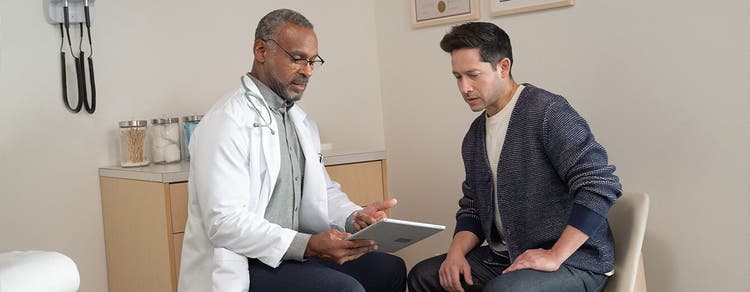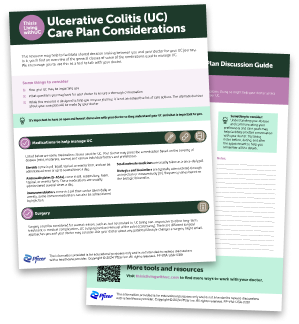Your Doctor & You


UC Care Collaboration
UC can affect everyone differently, so it's essential that you play a role in the decision-making when it comes to how you and your doctor manage your care. And because UC can affect everyone differently, it’s essential to speak with your doctor about your unique disease impact to get the best care possible. The more open and communicative you are, the better conversations you’ll have with your doctor. That’s where shared decision-making comes in.
What Is Shared Decision-Making?
Shared Decision-Making is a treatment model in which patients and healthcare providers proactively discuss the patient's condition. This process balances a doctor’s expertise with each patients’ preferences, priorities, and lifestyle. Not sure where to start? We’ve got a resource that may help. Try the You, Me + UC Questionnaire.
A Resource for You and Your Doctor
This resource can act as a guide for you and your doctor as you navigate the unique aspects of your disease. It offers information about your care options for UC while highlighting discussion topics and common questions.

63%
Did You Know?
In a global survey, 63% of people living with UC said they wish they had more time with their GI doctors.1
Questions to Get Started
- What are my options to help manage my UC?
- What can I do to monitor my UC?
- Where can I get resources or connect with others about my condition?
- What else can I do to improve my health with UC?
Set Goals
- Consider what remission means to you, and try setting a realistic timeframe around any goals you may have
Come Prepared
- Beforehand, list all of your questions and concerns since you know yourself and your needs better than anyone
Take Notes
- Bring a journal to your appointment or keep an open note file on your phone so you can ensure details are captured to refer back to
Follow-Up
- Make sure you know who you need to talk to, any relevant contact information, and the best time to call so you can stay on track toward your goals
- - Rubin DT, et al. Ulcerative colitis narrative global survey findings: communication gaps and agreements between patients and physicians. Inflamm Bowel Dis. 2021;27(7):1096-1106.


